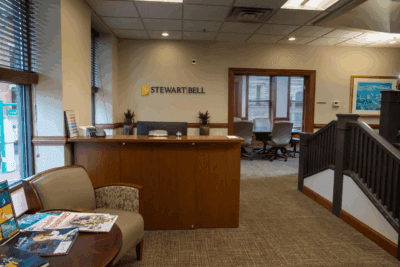
The Short Answer…
The types of abuse in nursing homes include physical, emotional, sexual, financial, neglect, abandonment, and self-neglect. Each type of mistreatment can severely impact a resident’s health, safety, and well-being, making it vital for families to recognize the warning signs and take action.
At Stewart Bell, PLLC, we are dedicated to advocating for nursing home abuse victims and ensuring their rights are upheld. In this article, we will explore each type of nursing home abuse in detail, discuss the warning signs, and provide guidance on what to do if you suspect a loved one is being mistreated.
Key Takeaways
- Warning signs vary by type of abuse but can include injuries, sudden behavioral changes, financial discrepancies, and poor hygiene.
- Perpetrators of nursing home abuse may include staff members, administrators, or other nursing home residents.
- If you suspect abuse, document evidence, report the issue to the proper authorities, and seek legal assistance.
- An attorney can work to protect residents’ rights by investigating claims, gathering evidence, negotiating settlements, and pursuing legal action to hold negligent parties accountable.
The 7 Major Types of Abuse in Nursing Homes
Nursing home abuse can take many forms, and recognizing these different types is crucial to ensuring the safety and well-being of elderly residents. The main forms of abuse that occur in nursing homes include:
1. Physical Abuse
Physical abuse occurs when a resident suffers harm due to intentional force. This includes hitting, slapping, shoving, or using inappropriate restraint.
Common Nursing Home Abuse Injuries:
- Bruises, cuts, or broken bones
- Concussions or head trauma
- Signs of restraint marks
Warning Signs:
- Frequent hospital visits
- Fear of specific staff members
- Sudden behavior changes
2. Emotional & Psychological Abuse
This type of abuse includes verbal assaults, threats, humiliation, and isolation, leading to emotional distress.
Examples:
- Yelling, name-calling, or degrading remarks
- Ignoring or isolating residents
- Intimidation or threats
Warning Signs:
- Depression, anxiety, or withdrawal
- Sudden mood swings
- Fearfulness or reluctance to speak
3. Sexual Abuse
Sexual abuse involves any non-consensual sexual contact with a resident.
Examples:
- Unwanted touching
- Coerced nudity
- Sexual harassment
Warning Signs:
- Bruising around sensitive areas
- Genital infections
- PTSD-like symptoms
4. Financial Abuse & Exploitation
This occurs when someone illegally or improperly uses a resident’s financial resources.
Examples:
- Unauthorized withdrawals
- Forged signatures
- Stolen personal belongings
Warning Signs:
- Unexplained bank transactions
- Missing valuables
- Sudden financial trouble
5. Neglect
Neglect happens when caregivers fail to meet a resident’s basic needs, leading to health complications.
Forms of Neglect in Nursing Homes:
- Medical Neglect: Failure to provide necessary medical care
- Personal Hygiene Neglect: Unclean clothing, untreated bedsores
- Malnutrition & Dehydration: Weight loss, dry skin, confusion
Warning Signs:
- Unsanitary living conditions
- Bedsores or infections
- Malnutrition or unexplained weight loss
6. Abandonment
Abandonment is the desertion of a nursing home resident without proper care.
Examples:
- Ignoring distress calls
- Leaving residents unattended
- Failure to provide food, water, or medication
Warning Signs:
- Malnutrition or dehydration
- Unattended injuries
- Confusion or disorientation
7. Self-Neglect in Nursing Homes
Self-neglect occurs when residents cannot care for themselves and do not receive the necessary intervention.
Warning Signs:
- Poor personal hygiene
- Untreated medical conditions
- Unsafe living conditions
Who Commits Nursing Home Abuse?
Nursing home abuse can be committed by various individuals who have access to vulnerable residents:
- Nursing Home Staff: Overworked or improperly trained staff may become abusive. Nursing homes can be held legally responsible for failing to train and supervise employees.
- Nursing Home Administrators: When management neglects complaints, ignores safety protocols, or hires unqualified staff, they contribute to abuse.
- Other Residents: Some residents may abuse others physically, emotionally, or financially. Nursing homes must intervene to prevent harm.
If you suspect that a loved one is experiencing abuse, consulting a nursing home abuse attorney can help you understand your legal options and take the necessary steps to seek justice.
What To Do If You Suspect Abuse
If you notice warning signs of abuse, take action immediately:
- Document the Evidence: Take photos and keep records of injuries or changes in behavior. Speak to other residents or staff members who may have witnessed the abuse.
- Report to Authorities: Contact Adult Protective Services in West Virginia. Provide as much detail as possible to aid in a thorough investigation.
- File a Complaint: Notify the nursing home administration and request an internal investigation
- Seek Legal Help: An experienced nursing home abuse lawyer can help you take legal action. They can assist with gathering evidence, filing claims, and representing your case in court.
How Can a Lawyer Help Nursing Home Abuse Victims?
At Stewart Bell, PLLC, our attorneys in Charleston, Dunbar, Huntington, and across West Virginia fight for nursing home abuse victims. We help families pursue justice and compensation while holding negligent facilities accountable.
Our skilled attorneys can assist you by:
- Gathering Evidence: We will collect medical records, witness statements, and facility reports to build a strong case.
- Consulting With Medical Experts: Our network of medical professionals can help establish the extent of injuries and the standard of care that was violated.
- Negotiating with Insurance Companies: We fight aggressively to help you seek the maximum compensation available and ensure you aren’t pressured into unfair settlements.
- Representing You in Court: If necessary, we are fully prepared to take your case to trial and hold negligent parties accountable.
Nursing home abuse is a serious issue that can lead to devastating consequences for residents and their families. If you suspect that your loved one is experiencing any form of abuse in a nursing home, seeking legal assistance can help you navigate the complexities of your case and hold negligent parties accountable.
We are dedicated to protecting the rights of nursing home residents and fighting for the justice they deserve. Let us provide the legal guidance and support you and your loved one need. Contact us today for a free consultation.





